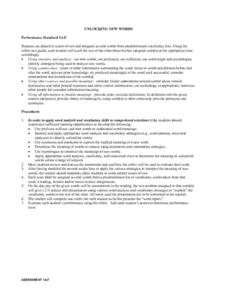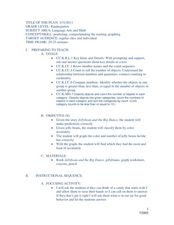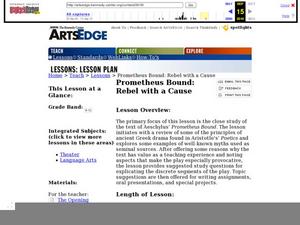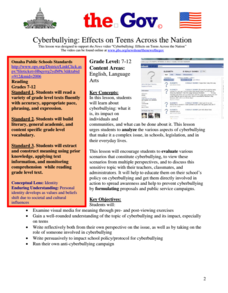The New York Times
Fiction or Nonfiction? Considering the Common Core's Emphasis on Informational Text
Nothing aids in comprehension more than an explanation and understanding of why things are done. Address why the Common Core requires the reading percentages that it established and analyze how this affects your readers. Learners read...
Curated OER
Adapting "List/Group/Label" to Literature
Need a prereading activity in line with the Common Core Standards for Language? Although designed for grades 11 and 12, the procedure detailed in this resource could be used with most grade levels. Prior to reading, select 20 – 25 words...
Southern Nevada Regional Professional Development Program
Review Games
Boggle, Jot Thoughts, Trading Cards, Commercial Breaks, Snowball Fight, Bingo, Draw it! Here’s a bunch of review games that would make a great addition to your curriculum library. The games can be easily adapted to address the Common...
Curated OER
Folktale Writing
Review literary analysis techniques with this reading lesson about folktale writing. Middle schoolers read different folktales from many authors, and write their own folktales to share with the class. They identify the plot, morals and...
Curated OER
When Is a Noun a Verb? Examining Double Duty Words
The New York Times' Learning Network provides great lessons! This one uses articles from the paper to help readers understand homonyms like mail (verb and noun). It also includes an exercise in reading informational text. Links to the...
Curated OER
Structured Academic Controversy (SAC) in the History Classroom
SAC is a specific approach to discussing history and controversial issues. Rather than adhering to an either/or debate-style paradigm, it fosters speaking and constructivist listening to enable learners to build consensus through...
Growing Minds
Lettuce Exploration
Kathy Henderson’s book And the Good Brown Earth introduces the class to how a vegetables grows and changes over time. They use different types of lettuce to do a close study of this quick-growing vegetable. Learners consider the look,...
Curated OER
Plant Parts We Eat
I bet the kids in your class will love to eat their vegetables after an engaging lesson about edible plants. They read information about vegetables and edible plants, sort vocabulary words, identify plant parts, measure and graph the...
Curated OER
Unlocking New Words: Partner Presentations
Following extensive modeling about how to apply word analysis and vocabulary skills to learn new words, partner teams create brief word presentations to teach new vocabulary to the class. Preselect words from upcoming social studies,...
Curated OER
Stage a Debate: A Primer for Teachers (Lincoln-Douglas Debate Format)
For a comprehensive overview of debate styles and formats, look at this resource. It details the Lincoln-Douglas debate format (one-to-one debate with specific, timed rounds of points, cross-examination, and rebuttals). You can also find...
Curated OER
Investigating the Harlem Renaissance
The work of Langston Hughes opens the door to research into the origin and legacy of the Harlem Renaissance and how the literature of the period can be viewed as a commentary on race relations in America. In addition, groups are assigned...
Curated OER
The Jellybeans and the Big Dance
Enchant your youngsters by reading them The Jellybeans and the Big Dance, by Laura Numeroff and Nate Evans. Ask them to name objects that begin with the letter J like jellybeans. Give each of them some jellybeans to sort by color. They...
Curated OER
Persuasive Speech in Julius Caesar
After reading Julius Caesar 1.2 and 1.3, break your class into pairs for this role-play. Each pair will receive one of four prompts (or more, if you create additional examples), in which one person tries to persuade the other to do...
Southern Nevada Regional Professional Development Program
“Double Double Speak Speak”
Bilateral suborbital hematoma? Call an audible? 404? Have fun with “the twittering or warbling of birds,” or as 14th century French speakers would say, have fun with “jargon.” Groups match specialized jargon with plain speech, decode...
Curated OER
Prometheus Bound: Rebel with a Cause
If you are teaching Aeschylus' Prometheus Bound, you can't afford to miss this source. An extensive list of ideas outlines numerous discussion topics, writing prompts, comprehension questions, oral presentations, and projects. Have class...
Curated OER
The Effects of Slavery
The emotional and spiritual oppression of slavery in the African-American experience is the focus of this instructional activity. Middle schoolers analyze various texts by Frederick Douglass and Maya Angelou related to freedom and...
Curated OER
Lesson Plan: The Net Neutrality Debate
Should Internet users who send data-heavy content pay higher fees than those who are involved in activities, like sending an email, that have less content? This question is at the heart of the Net Neutrality debate. After watching a PBS...
Curated OER
Hamlet Research Paper: Find, Evaluate, and Select Appropriate Research Sources
Help young researchers find credible sources online. Modeling with a Google search for information about Shakespeare’s Macbeth, use a computer projector or Smart Board to show class members how weak the top three search results are....
Curated OER
Plagiarism: Avoiding Accidental Internet Plagiarism
Demonstrate how to cite information from Internet sources without plagiarizing. If your class is working on an Internet research paper, and you have observed learners cutting and pasting directly from the Internet, the activities and...
Curated OER
Who Was That Man?
Develop historical analysis and interpretation with your older learners. They will study and analyze three given interpretations of Christopher Columbus' life, which includes significant events, his character, and the impact he made on...
Curated OER
Descriptive Writing: Using Art to Inspire description
Write with the senses! Try using art to inspire writers to consider all of the senses. Here, the class is divided in half. Each group looks at one of two images, imagines the senses that would be engaged, and records answers to five...
Curated OER
Cyberbullying: Effects on Teens Across the Nation (Segment 3)
Free speech, privacy, and cyberbullying are the focus of a series of activities that prompt class members to engage in discussions about these interrelated topics. They view a segment from PBS’s series on bullying, read articles about...
Curated OER
Encouraging Answers
What is the celebration of Columbus Day really about? Older learners use inquiry-based methods to find out who Columbus really was and what motivated his journeys. They take on the roles of town officials who must consider whether or not...
Curated OER
Propaganda
How does word choice affect the reading of a text? Compare two headlines that were written about the same event. Is one biased? Discuss how word choice often reveals the author's feelings about a topic. Then look at different techniques...

























